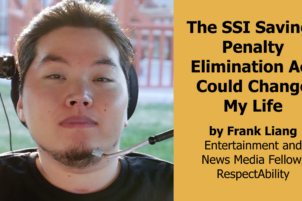As a final project for her Spring Fellowship, Policy Fellow Emily Snodderly wrote and delivered this policy speech examining the practice of paying subminimum wages to people with disabilities.
 In 1938, the Fair Labor Standards Act created the federal minimum wage, but it included an exception for people with disabilities. The exception was intended to preserve employment opportunities for people, especially wounded veterans, who couldn’t keep up with “normal production” in factories. Now, 85 years later, thanks to this law, an estimated 53,000 workers in the United States earn less than minimum wage, sometimes pennies per hour, solely because they have a disability.
In 1938, the Fair Labor Standards Act created the federal minimum wage, but it included an exception for people with disabilities. The exception was intended to preserve employment opportunities for people, especially wounded veterans, who couldn’t keep up with “normal production” in factories. Now, 85 years later, thanks to this law, an estimated 53,000 workers in the United States earn less than minimum wage, sometimes pennies per hour, solely because they have a disability.
This is the typical experience of a worker with a disability earning subminimum wage. We’ll call her Janet. Janet is a 35-year-old woman with an intellectual disability. For the last 15 years, she has worked in something called a sheltered workshop. Like Janet, all her coworkers have some sort of disability. For 10 hours a week, they sort and package products like jewelry or soap. Every 6 months, Janet’s supervisor times how fast she works in order to justify her current wage. She earns $4 an hour–about average for sheltered workshop employees. After an entire year of sorting and packaging the same way every day, Janet has earned a grand total of $2,000.
Oftentimes, when I first tell someone about subminimum wage employment, their reaction is positive. They say, “Isn’t that a good thing? If employers can pay lower wages, it incentivizes them to hire people with disabilities. Plus, people who couldn’t otherwise get a job get the satisfaction of having a job.” However, this perspective is based on two false assumptions.
The first false assumption is that allowing subminimum wages increases employment opportunities for people with disabilities. In reality, the subminimum wage program has never incentivized real employment. It specifically supports sheltered employment–the type of segregated employment I described earlier. Sheltered employment–by its nature–is discriminatory. It isolates people with disabilities from the community, pays them a meager wage that could in no way lead to financial independence, and teaches them no transferable skills. Because of this, as studies have proven, sheltered workshops actively hurt people’s ability to gain competitive employment. Meanwhile, the workshop makes a profit. Is this employment, or is it exploitation?
The second false assumption is that people with disabilities are incapable of being productive employees in the competitive workforce. This is a pervasive idea in our society, but is it true? Evidence from social research and service providers has consistently shown that people with significant intellectual or developmental disabilities can work successfully in the same positions as their non-disabled peers when they have the proper supports. There are hundreds of stories of people with intellectual and developmental disabilities who work for competitive wages in real businesses, or schools, or hospitals, or for themselves as entrepreneurs. Many of them performed poorly in a sheltered workshop setting. Essentially, people with disabilities can work, and laws and programs that assume they can’t are ultimately harmful and decrease employment opportunities.
There is currently an effort to eliminate the subminimum wage program and sheltered employment and replace it with an alternative service model: supported employment. Supported employment is an evidence-based practice of supporting people with disabilities in gaining and retaining employment in the community at competitive wages. Supports are government funded, and may include job search assistance, skill training, or job coaches. Advocates of supported employment created a plan to make this a reality: H.R. 1263: The Transformation to Competitive Integrated Employment Act, or TCIEA for short. The TCIEA is a federal bill introduced earlier this year and it has two major provisions: It phases out subminimum wage certificates over the course of 4 years, and provides grants and technical assistance to sheltered workshops to transition to a supported employment model.
To examine how this transformation would affect stakeholders, we can look to states and organizations that have already successfully made this transition. The National Council on Disability – the nonpartisan federal agency that advises Congress on matters that affect people with disabilities – did case studies in 6 states exploring how former sheltered workshops embraced the supported employment model and how the transition impacted the community.
In many cases, leadership at sheltered workshops and parents of sheltered workshop employees were initially against the change. They worried that the workers would be unable to find community employment after the workshops were closed. But these concerns were revealed to be unfounded. With the new support, employees were able to gain meaningful employment at competitive wages, engage in the community more, and make new friends, expanding their social networks while maintaining contact with old friends. Likewise, staff found that it was easier, more effective, and more cost-efficient to provide supported employment for people with disabilities than to maintain sheltered employment. Overall, even the people most vehemently against transitioning sheltered employment programs to supported employment programs eventually shared their support for the transformation. And considering the reduced costs and the increased financial independence of the employees with disabilities, taxpayers will be happy too. Eliminating subminimum wage sheltered employment and replacing it with supported employment in the community benefits everyone.
If you believe that the practice of paying people with disabilities subminimum wage is harmful and discriminatory and must end, I encourage you to call or write your U.S. House Representative and ask them to co-sponsor TCIEA. Let them know that embracing supported, community employment instead is essential, achievable, and beneficial to all stakeholders. You can find more information from the National Council on Disability or the Association of People Supporting Employment First. Let’s create a world where people with disabilities have the same rights and opportunities as anyone else.







